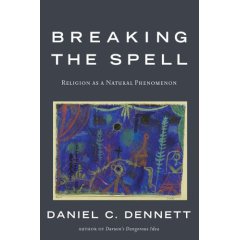Breaking the Spell–Dennett on religion
 Daniel Dennett’s Breaking the Spell: Religion as a Natural Phenomenon is due out at the beginning of February.
Daniel Dennett’s Breaking the Spell: Religion as a Natural Phenomenon is due out at the beginning of February.
As one of America’s leading contemporary philsophers, Dennett’s choice of this topic gives it great legitimacy. The book will be a must-read for anyone interested in the area (although personally I’ve always found Dennett’s writings tough sledding).
Dennett is not just out to explain religion here. That would have been a different book, probably very much like Boyer’s “Religion Explained”. No, Dennett wants to stomp out religion. It’s a prehistoric vestige, overgrown belief in ghosts, a bunch of old superstitions gussied up with guys in mitres. Look at the title again: Dennett wants to break the spell. He “elegantly pleads for religions to engage in empirical self-examination to protect future generations from…ignorance” (right). In one interview, Dennett stated: “I have absolutely no doubt that the secular and scientific vision is right and deserves to be endorsed by everybody, and as we have seen over the last few thousand years, superstitious and religious doctrines will just have to give way.”
I’m sympathetic to this line of reasoning as far as it goes, but it does not nearly go far enough. As I mentioned in my review of Boyer’s book, this type of strictly static evolutionary and sociological analysis omits two critical factors from the equation: transformation and transcendence . Looking past traditional religions and doctrines to a spectrum of belief systems, practices, and frameworks, where do they map onto the space of types of personal transformation? And what is the nature of transformative, transcendant experience, and in particular what is its biological basis, if it does in fact have one as neurotheology assumes?
Without looking at questions like these, we are left with a crippled, fragmentary account of religions. We cannot understand Christianity, even as it exists today in its calcified state, without thinking about what happened to Jesus during his 40 days in the wilderness. We cannot understand Buddhist thought without reference to its tradition of introspective practice. And we can understand neither completely without a model of neurobiological precedents or consequences.

February 20th, 2006 at 05:50
You might find the Buddhist take interesting. Listen to Dennett’s conversation with Robert Thurman here:
http://www.blog.mindandreality.org/articles/2006/01/25/breaking-the-godspell
December 31st, 2006 at 07:31
I have been reading Dennett’s tome on relgiion and he has legitimate arguments from his point of view, but you are right in that the question of transfomation and transcendce is one of the deeper aspects of religious experience that cannot be quantified in a scientific mannner. One has to admit that reading of William Jame’s book “The Varieties of Religious Experience”, takes into account many of the things that Mr. Dennett would like to see eradicated from human experience. Yes it is true that superstition and ignorance can be perpetuated by religious doctrine and dogma I think that that was covered very well by Eric Fromm when he subjected relion to psychoanalysis, however CG Jung would include everything into his world of psyche all events are psyhic in nature. The fine border of reductionism is there in Freud his teacher whom he broke with in 1908 where the student JUng could not accept the limitations of science and neurology which Freud solemnly embraced as his doctrine. They both investigated dreams and because of their different orientations and point of view one can see that Jung was bold and not afraid to investigate dreams let alone the nature of religious experience. So I believe tha Dennett is on the right track, although he is probably mistaken that religion will fold and just go away. In order for that to happen people will need to think seriously about what they believe and how many are willing to do that? Asking questions is the nature of philosophy and one may never arrive at an answer but it is a worthwhile endeavor.
Peter Tarsiio